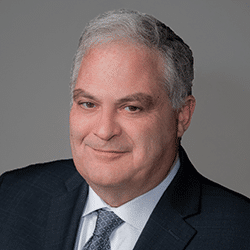Parties struggle while a dispute remains unresolved, especially in cases involving wrongful deaths and catastrophic injuries. The risks associated with jury trials can amplify that distress.
“Particularly for plaintiffs, the litigation is often the first thing they think about in the morning and the last thing they think about at night,” said Hon. Larry G. Axelrood, (Ret.), senior mediator and arbitrator at ADR Systems. “When you achieve a settlement, it is very often a visceral, cathartic moment for the parties. From then on, they can begin to move forward.”
That opportunity to move forward is made possible because of the security and consolation that a settlement in mediation can provide.
Hon. Dennis J. Burke, (Ret.), senior mediator and arbitrator at ADR Systems, recalled a case in which the father of a child plaintiff used the settlement funds to pay his child’s medical bills, enroll him in a school best equipped to educate him and handle his special needs and pay legal fees on previous litigation related to the case. “It gave him back some control, and therefore peace of mind,” said Judge Burke.
A trial of such a case – and in fact a second trial for that family – would have exposed them to further financial challenges and the risk of recouping nothing in damages if a jury did not rule in their favor. Nor would it have provided the plaintiff and defendant the opportunity to work with, rather than against, one another.
Similarly, cases involving nursing home injuries and deaths can be fraught with confusion, anger and grief, but the mediation process can bring the plaintiff and the defendant together to further their understanding of the case.
“The how and the why questions of a case come into focus, and while that may not remedy all feelings, it provides a context that is vital for closure of the matter through a settlement agreement,” said Judge Axelrood.
It is worth noting that discussions of the impact of settlement agreements often focus on the plaintiffs, and understandably so: If the parties agree to a settlement, the plaintiff is receiving it. But the dynamic is not as simple as people may presume.
“Lawyers often think that if the parties all leave unhappy – not getting everything they wanted — the mediation is successful, but I don’t think that is necessarily true,” said Judge Burke. “Attorneys can have a narrow image of mediation in which each side is eager to outdo and outgain the other during negotiations. A successful mediation can include zealous advocacy, but both sides can leave happily satisfied when they listen to the other side and the mediator, are knowledgeable about their case and eager to bring it to a sensible end.”
Mediations offer a path forward in ways other legal proceedings do not. Its focus on negotiation allows the parties to retain control of the process, allowing them to work together and have more of a contributing stake in how the matter ends and how the parties move on.
Hon, Larry G. Axelrood, (Ret.) has extensive experience with medical malpractice, nursing home, railroad, legal malpractice, premises liability, construction and personal injury matters. Having served on the Evanston Police Pension Board and the Illinois Judges Association Pension and Benefits Committee, Judge Axelrood also has in-depth experience with pensions and their impact on various types of cases.
Request Judge Axelrood’s Availability.
Hon. Dennis J. Burke, (Ret.) has expertise in both commercial and personal injury matters. Following a 23-year legal career, he spent 15 years in the Cook County Circuit Court Law Division. An early advocate of alternative dispute resolution, Judge Burke created a program to mediate complicated discovery disputes – a program that is still used in the Circuit Court today. Judge Burke is well known for his keen ability to build trusting relationships with all parties.
Request Judge Burke’s Availability
ADR Systems, It’s Settled.®





